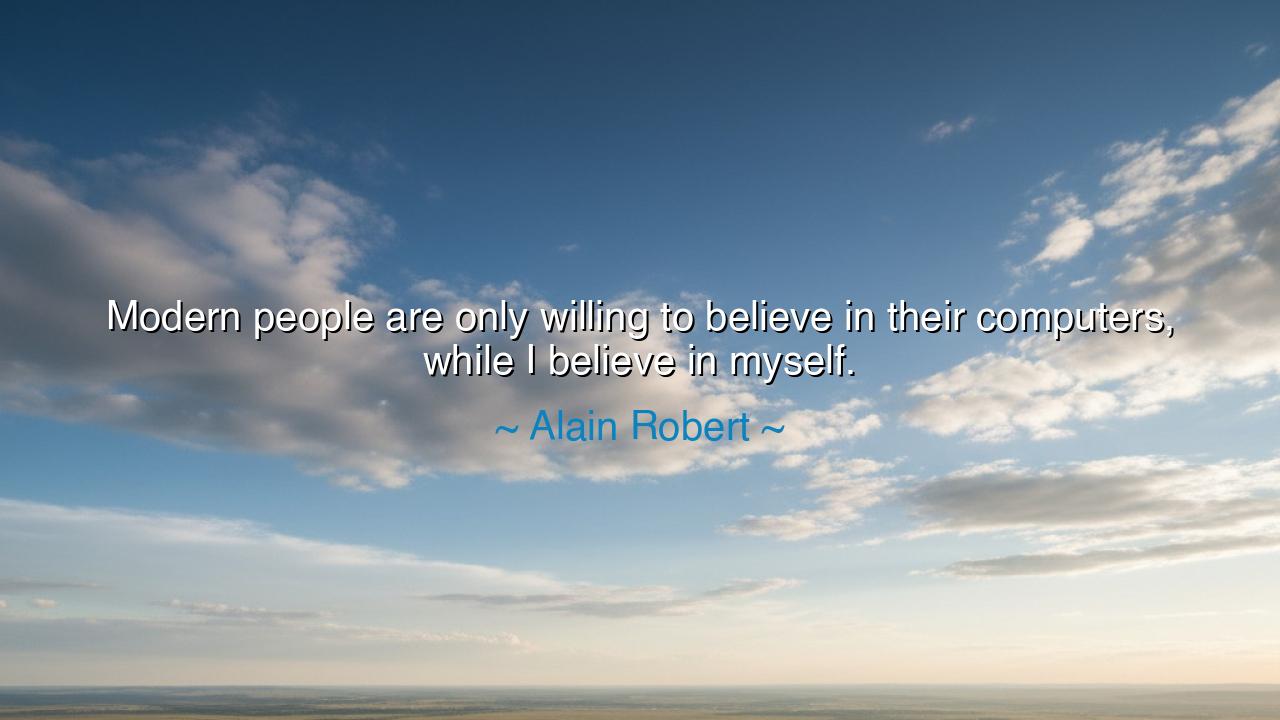
Modern people are only willing to believe in their computers
Modern people are only willing to believe in their computers, while I believe in myself.






In the ever-evolving tides of human history, there has always been a tension between the world that we create and the world that we are. Alain Robert, a man who scaled the heights of the tallest buildings in the world, distills this age-old struggle in a simple yet profound statement: "Modern people are only willing to believe in their computers, while I believe in myself." Here, he touches upon a deeper truth—a truth that transcends the age of machines and speaks to the heart of human nature itself. In an era where technology often reigns supreme, Robert’s words call us back to a fundamental belief in our own potential and the power that lies within us.
To understand the depth of this wisdom, we must turn to the ancients, who spoke of the importance of self-reliance. Heracles, the mighty hero of Greek mythology, did not rely on the tools or weapons of others. He believed in his own strength, his own resolve, and in the power of his own hands. The very foundation of his greatness was his self-confidence, his ability to face the most insurmountable challenges with nothing more than his own will and determination. In the same way, Robert’s declaration is not a rejection of technology, but a reminder that it is not the machine that should define us, but our own willpower, creativity, and strength.
Indeed, the rise of technology in modern times has brought both great benefits and peril. The computers that surround us, the devices that dominate our world, offer both convenience and power. Yet, in the rush to embrace these tools, we sometimes forget the one tool that has always been with us—our mind, our spirit, and our heart. Robert, by scaling the world’s tallest buildings with his bare hands, is a living testament to the power of the human spirit. He reminds us that we, as humans, are capable of extraordinary feats, not because of the tools we wield, but because of the strength of our own resolve.
Let us look to Leonardo da Vinci, whose genius transcended the tools of his time. He did not merely rely on the technology around him to create his masterpieces; he trusted his own mind and vision. His inventions, his paintings, and his insights into the world were all rooted in his belief in the power of human intellect and ingenuity. He may not have had the computers of today, but he had a far greater tool: his belief in himself. In this, he exemplifies the very idea that Robert’s words invoke—a human-centered belief in our own abilities, one that cannot be replaced by technology, no matter how advanced it may become.
In our own time, we may be tempted to place too much faith in machines and computers, to think that the answers lie in the tools we use rather than the strength of our own character and intellect. The lesson here is not that we should abandon technology, but that we should never lose sight of our own power in the face of it. We must use technology as a tool, not a crutch. The world is full of distractions, many of which come in the form of machines and devices that promise us quick answers and instant gratification. But true wisdom comes not from the ease of automation, but from the courage to face the world on our own terms.
The lesson of Alain Robert is one that calls us back to self-reliance, self-belief, and personal accountability. It is a reminder that no matter how much technology advances, there is no substitute for the power of the human spirit. We are not defined by the devices we use or the systems we operate in. We are defined by the strength of our will, the depth of our thought, and the courage with which we confront the challenges of life. Technology, like the great tools of the ancients, should serve us, not replace us.
Therefore, let us walk through life with confidence in ourselves, as Alain Robert did in his daring climbs. Let us use technology to enhance our journey, but never to replace our own ability to think, create, and act. In a world increasingly dominated by machines, it is more important than ever that we believe in ourselves—not as a mere sentiment, but as a powerful force that can shape the future. Just as the ancients believed in the power of the human spirit, so too must we. The future is not in the hands of machines, but in the hands of those who still believe in the strength of their own hearts and minds.






AAdministratorAdministrator
Welcome, honored guests. Please leave a comment, we will respond soon